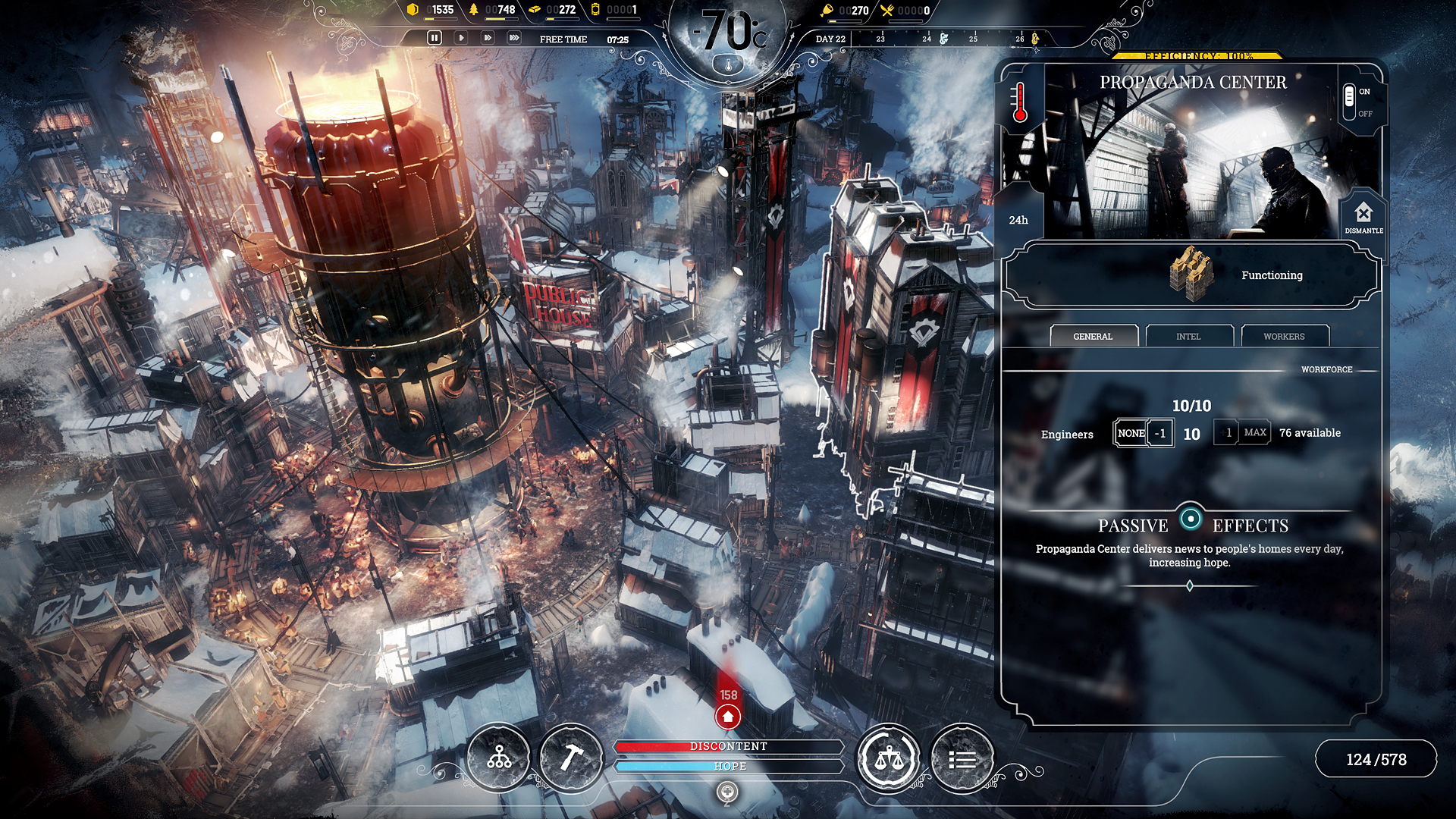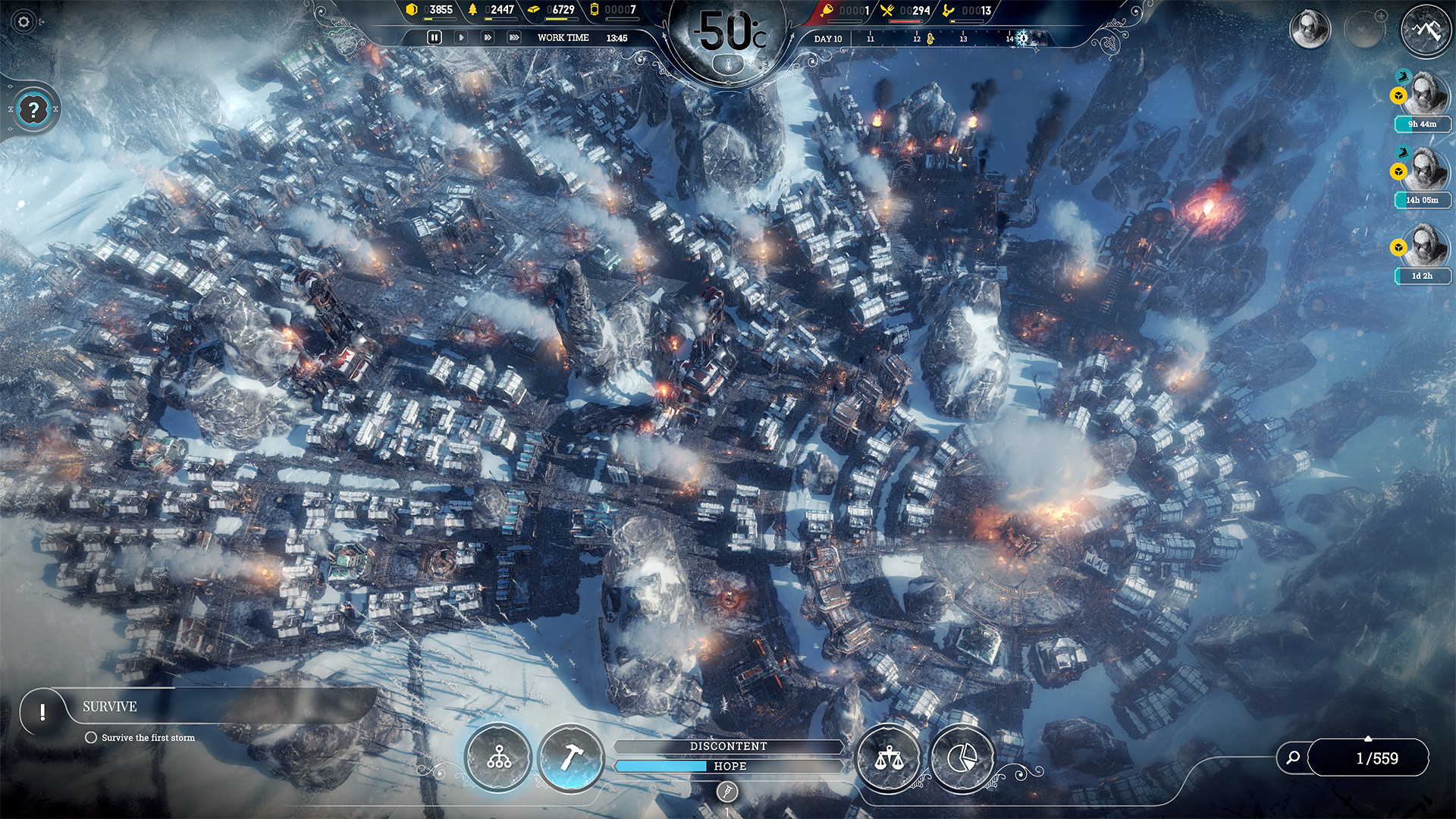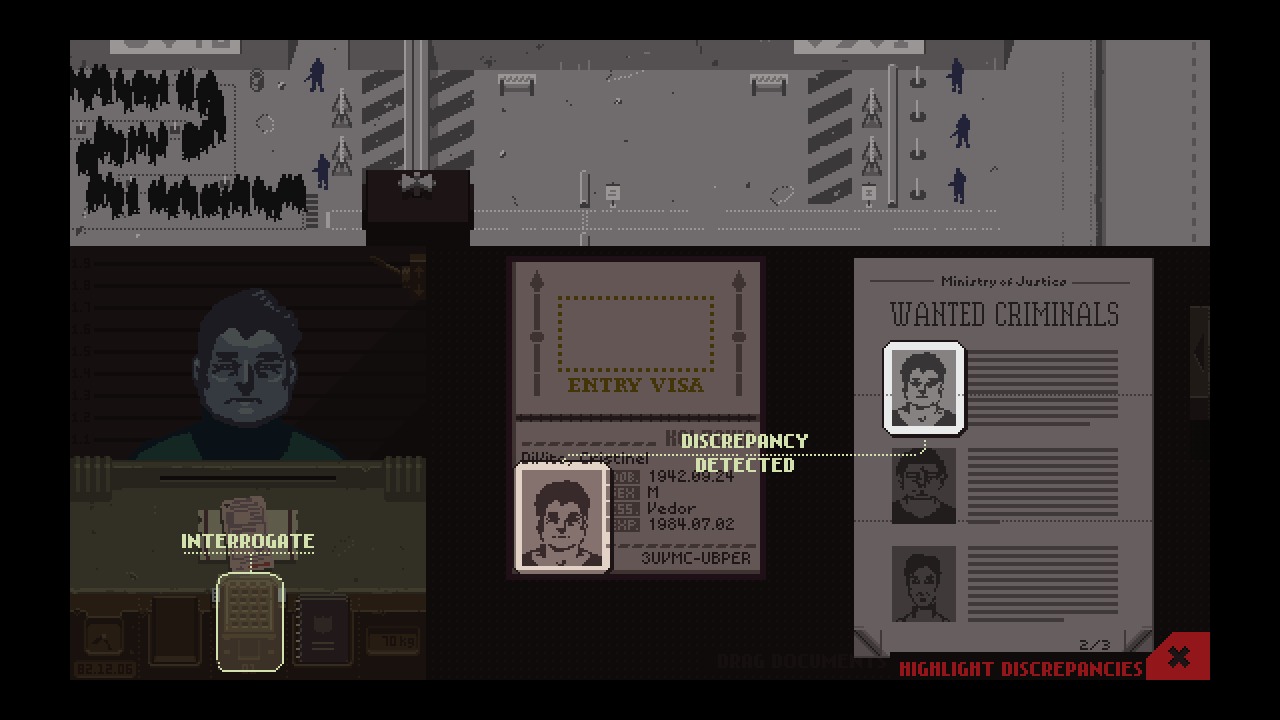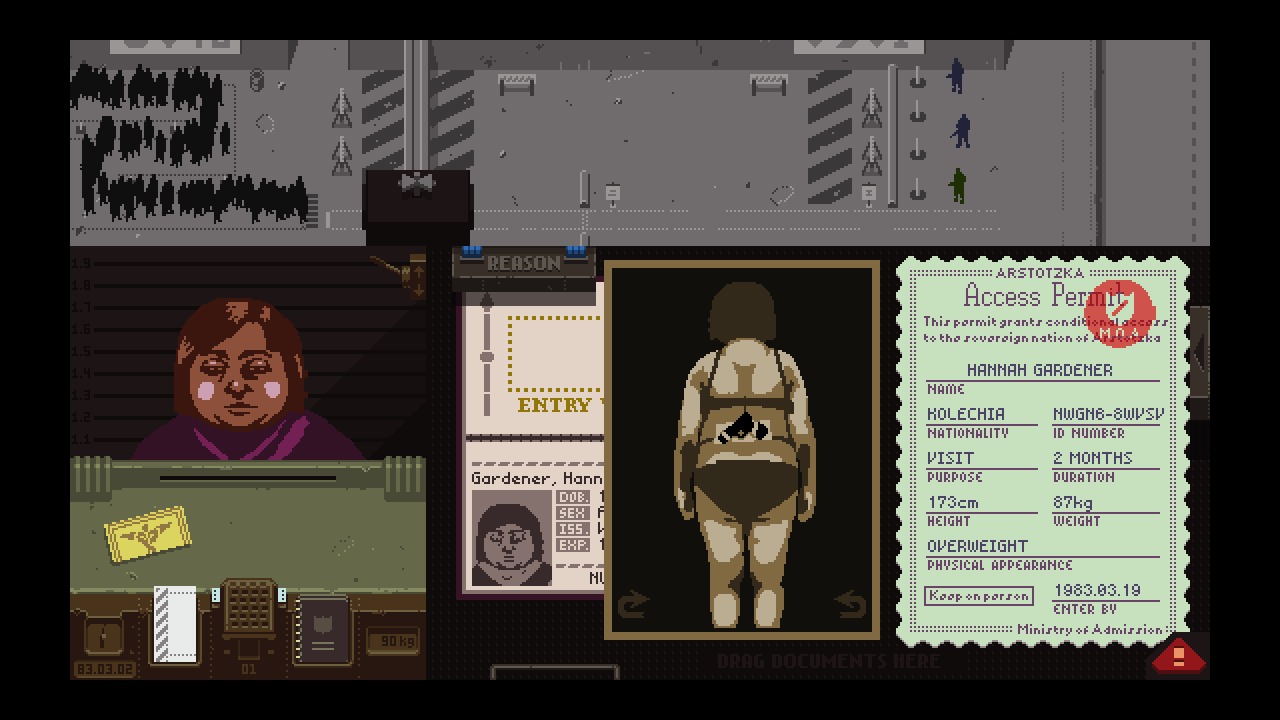Populist leaders with authoritarian designs are taking power the world over. Though many have not been remade into totalitarian regimes yet, it’s important to keep abreast of what totalitarianism is, what it looks like, and what effects it has on a nation on both a macro and micro level. Most important is the way totalitarian governments treat their people, flattening the concept of humanity into one homogeneous group while centralizing power in permanent one-party rule. The problem is that it becomes difficult to grasp the full cruelty and dehumanization taking place if you haven’t lived through it. Games, however, can provide a glimpse into the experience by cleverly utilizing genre tropes to illustrate what this dehumanization is like—viewing humans solely as capital and resources, imposing an oppressive atmosphere that feels inescapable, and even simulating the slippery slope into fascism that can come from well-intentioned policy. Two games in particular—Frostpunk and Papers, Please—show us the horrors of dehumanization as viewed through two different lenses: those in power, and those under totalitarianism’s thumb.
One of the main ways totalitarian regimes dehumanize its people is by boiling down the population into mere resources to be exploited. This approach serves multiple functions, emphasizing productivity as the prime beacon of virtue in a decadent world while simultaneously erasing any individuality in workers. Indeed, people become “workers,” mere cogs in the machine that is their country. Benito Mussolini’s National Fascist Party derived its name from faces littorio: a bundle of rods tied together. The symbol was meant to represent the strength that could be derived from tying weak, brittle people together to form something stronger and unified. The individual components would cease to be. There was only the one power, and the ones who wielded it.
Most games abstract reality to some degree, but the specific kind of abstraction that strategy games like Frostpunk rely on is incredibly instructive of the dehumanization of the workforce. Frostpunk casts you as the leader of a band of survivors after a climate crisis has struck the world, plunging it into a new ice age. You’re tasked with building a livable city around a heat generator as you construct homes, food facilities, and anything else it takes to make sure that your group survives. Your buildings don’t work, however, until you assign people to work in them. You can also lose people to illness, starvation, or cold, so you have to keep them healthy, lest your work force be cut to a fraction of what it was. Lose too many workers, and things won’t work as well as they once did, with buildings standing there vacant and inert. Your city needs people to plug into buildings to function.

This kind of abstraction is nothing new for strategy games. The genre typically equates success with the effective exploitation of all the resources available to you, which are usually indicated by a number next to a symbol. Workers are just numbers too, ones that you view as less than human almost from the word go. The difference in Frostpunk is that it gives you all the tools to remind you that they’re people at every step. If you click on a building, a list of those who occupy it will appear, complete with names for individuals. Dialogue from your workers will occasionally pop up on the screen as a reaction to your decisions. But none of it is particularly effective at driving home the point that these people are more than just resources, which effectively models how leaders can begin to cease to see the people they’re representing. Strategy game design dehumanizes people into mere components, leaving more room for the player to concentrate on the strategy. In fact, the one design choice that does break through the sense of abstract, strategy-game remove is the option to institute child labor. You may be desperate for higher work force numbers and be tempted to institute this law—they’re not actually kids, after all, just numbers—but you’re nevertheless forced to come face to face with the words “child labor” and ultimately decide if you’re okay with that.
The other big dehumanizing design that Frostpunk employs is its loss conditions. You don’t lose the game by having people die or managing your resources poorly—those are contributing factors, but they aren’t explicitly what you have to avoid. What causes you to “lose” the game is if your Hope meter bottoms out for too long or if your Discontent meter stays full for an extended period. If either of these two things happen, you’ll be exiled by an angry populace, or worse, executed. Keeping people healthy isn’t a goal in and of itself, but rather a modifier applied to Hope and Discontent. And as long as you don’t bottom out on Hope or max out on Discontent, it doesn’t matter how bad the people are suffering, just as long as it’s not enough to force them to rise up against you. It’s not about helping your people thrive, it’s about quelling the masses. Later on, you can go in one of two different directions to stabilize the mood of your city, Order or Spirituality, but they both arrive at a similar endpoint of complete totalitarian takeover. You can even start building propaganda centers and forming inquisitions to keep people in line. Both of these paths end with an option that amounts to complete control of the populous, locking away either your Hope or Discontent meter to signify you no longer need to worry about it going forward. The rods are now a bundle. Your takeover of the masses is complete.

That’s one effective example of how totalitarianism is viewed through the lens of those in power. But there’s another viewpoint that’s arguably more important: that of the common person living under an oppressive regime. Papers, Please casts you as a border agent working for the totalitarian government of the fictional country of Arstotzka, dictating who gets to enter the country based on their travel documents. If anything appears amiss with these forms, you are expected to deny entry. The inspection process slowly gets more and more thorough and intrusive. At one point, you’re given a body scanner and must look at people’s bodies under their clothes to see if they’re concealing anything harmful.
The thing is, you’re not actually required to follow government guidelines when deciding whether to let people in or not. At the end of each day, you’re paid based on your performance, including deductions for any violations you allowed. Sometimes you’ll be tempted by bribes or promises of regime change from mysterious organizations, but if you are too lax with your inspections, the government will retaliate against you and your family. And even if you don’t get caught by the gestapo, deductions from your pay may slowly starve your family, as you still must pay for the necessities.

Papers, Please constantly gives you impossible choices and temptations, but you begin to realize that the temptations aren’t from bribes and bending the rules. No, what you’re tempted with is settling into a rhythm, melting into the status quo until you’re just a cog in Arstotzka’s brutal machine. The faces that pass by your station, already nondescript to begin with, start to blend together. The monotony of the job only accentuates all this. On the occasions you decide to defy the government, it feels like such a big violation that you’re afraid to do it again. Everything around you is screaming at you to obey in the dull voice of inevitability, sounded by the oppressive atmosphere that the scenario and graphics create.
Mussolini described totalitarianism in general, and fascism in particular, as “everything within the state, nothing outside the state, nothing against the state.” Everything about the way totalitarianism functions treats a society like cogs in a machine, but most insidious is how it convinces the people themselves to adopt this perspective. Through propaganda, totalitarianism espouses virtues of coming together and unity that metaphorically beat the individualism out of the individual. Papers, Please does a great job of recreating this atmosphere thanks to its limited field of view. Most of the time, your view is of your inspection post and the line to get into the country. You don’t even get to see your house when you go home for the day. Your job and your duty is everything, making you feel claustrophobic but also resigned to your fate. It’s only when reminders of your own humanity appear—the cases where you want to let people in even though you know you shouldn’t—that you’re given a peek into a better life, one where you can be a whole person instead of part of an institution.

Totalitarianism dramatically affects every stratum of society. From the top reaches of power, it dehumanizes the masses until they’re just a resource to be taken advantage of. And from the bottom, it convinces the common person that they’re less than human, just a piece of a whole being. No matter what perspective you’re looking from, it’s insidious in its completeness, smothering anything that would run counter to it.
With any luck, most of us won’t know truly know what it feels like to live under a totalitarian regeme. But games, in their fixed viewpoints and their spreadsheet-like abstraction of resources, allow us to explore in some small way the brutality and lack of humanity in authoritarian leadership, as well as how totalitarianism takes root and sustains itself. Maybe then we’ll be ever so slightly better equipped to fight it.
Header image credit: 11 Bit Studios

Jeremy Signor brings quality games writing from the wilds of north-central Pennsylvania. He’s been in the freelance game now for nine years. You can find his byline at EGM, Unwinnable, PCGamesN, Gamespot, USgamer, and elsewhere. He’s also a radical dude in every sense of the phrase. Follow him on Twitter @Jeremy_Writes to find out why.
